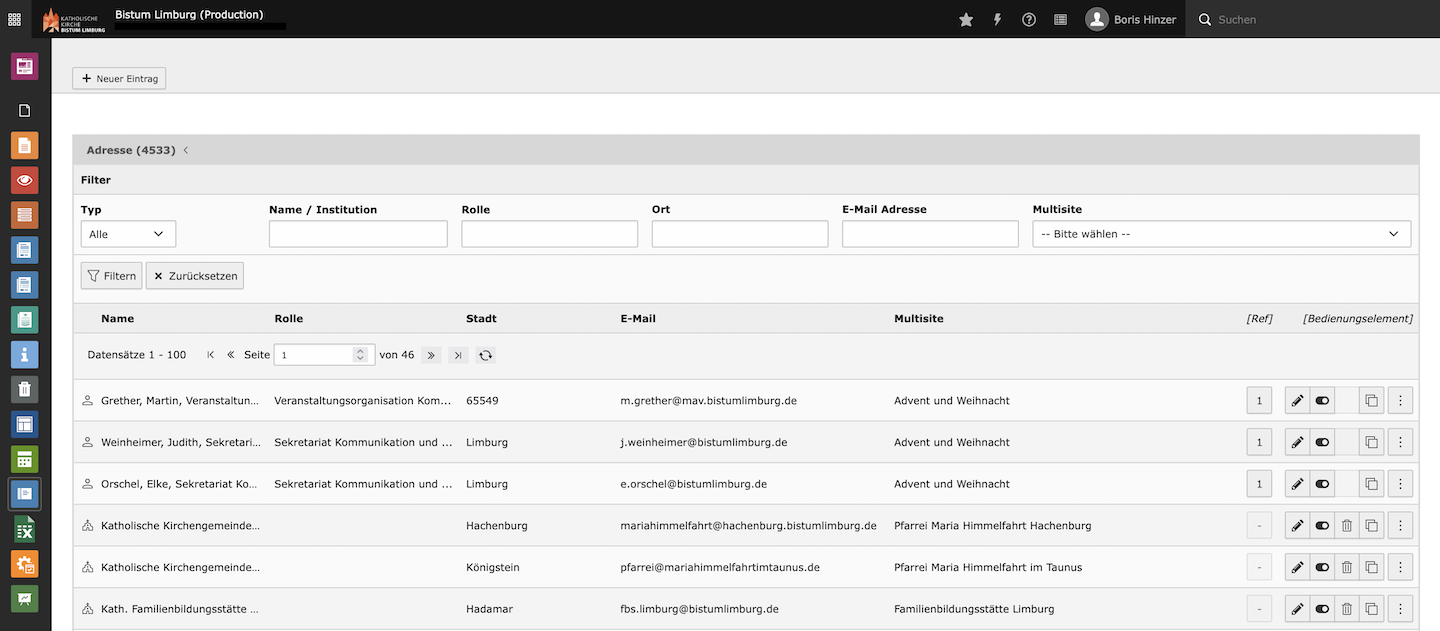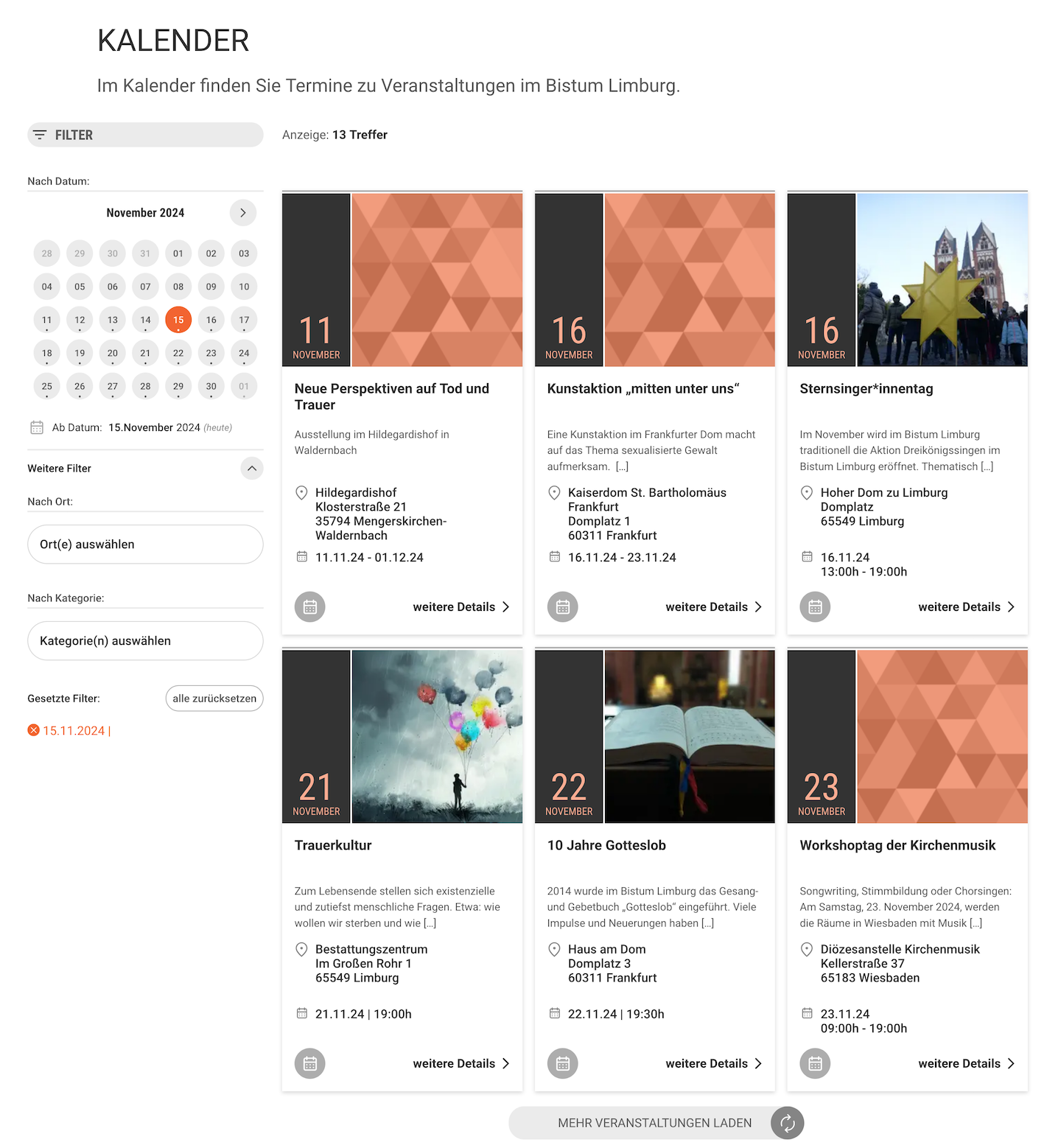380 Websites for Bistum Limburg
The initial situation: TYPO3 with vendor lock-in
In September 2022, the consulting company Consileon approached web-vision to carry out an initial analysis of the TYPO3 instance of the Diocese of Limburg. The aim was to check the condition of the existing TYPO3 v8 LTS installation and decide whether an upgrade or a complete relaunch would be the more sensible solution.
During the analysis, it quickly became clear that the system had been heavily modified and that significant parts of it had been developed without the TYPO3 core. One striking example: the TYPO3 instance hosted around 350 individual websites - from church institutions and parishes to daycare centers. Instead of using the multi-site function with different root pages in the TYPO3 page tree, all content was housed in a gigantic storage folder containing around 45,000 articles.
There were also considerable technical challenges: The instance ran entirely without caching, and a custom-built editorial system that contradicted the fundamental principles of TYPO3 had been integrated into the content management system.
It quickly became clear that the previous solution corresponded to a vendor lock-in, which meant that neither the publicly available TYPO3 documentation could be used nor was the instance comparable to TYPO3 in terms of its basic functionality. Apart from the login interface and the outer shell, the system had little in common with TYPO3.
Special challenges: Selective content migration and 500 editors
After a comprehensive needs analysis, the diocese of Limburg, in collaboration with Consileon for design and project coordination and web-vision as TYPO3 agency, decided on a complete relaunch of the platform, which had now grown to 380 websites.
One of the biggest challenges was the content migration from the old system. The aim was to enable the approximately 500 editors to continue working on the old TYPO3 8 instance without any restrictions until the conversion of their respective websites. To ensure this, web-vision developed an innovative migration process that was able to selectively identify and migrate the content of the multisite. The actual migration was fully integrated into the deployment process so that it could take place without downtime for both the editors and the users of the websites.
This process ensured that the new TYPO3 system was available to the editors "turnkey" after their training - equipped with the correct rights, already migrated content and optimized functions.
A flexible roles and rights system was introduced to give editors exactly the access rights they need for their work. This allows permissions to be set specifically for individual users or groups. In TYPO3's multisite environment, editors are only given the editing functions that are relevant to them without being overwhelmed with unnecessary options. In addition, the Content Notes extension for TYPO3 was developed for the Diocese of Limburg, with which editors can receive helpful instructions directly on the content pages.
Open source cooperation for Site Wizard
In order to enable the diocese of Limburg to create new multi-sites at any time and without programming effort, a cooperation was entered into with the Sudhaus7 agency in the spirit of open source. The site wizard developed by Sudhaus7 makes it possible to copy prepared template pages for new multi-sites and then fill them with individual content.
As part of the project, the TYPO3 extension was jointly developed further to integrate additional functions. These include the automatic copy function for roles and permissions, the transfer of file shares and flexible customization options such as the selection of individual logos and color combinations. These improvements ensure that new multi-sites can be created quickly, easily and fully customizable.
Simple address and contact management for 4,500 employees and institutions
Around 4,500 people work in the diocese of Limburg, including both volunteers and full-time employees in various roles. A special TYPO3 backend module was developed to display and efficiently manage these people within the individual multi-sites.
This module offers a powerful search and filter function that allows users to search specifically by name, institution, role, location, email address or the associated website. This allows contact details and contact persons in the Diocese of Limburg to be created, edited and managed quickly and easily.
Kufer integration and advanced search for the event calendar
The Diocese of Limburg organizes numerous events, courses and series for various target groups and subject areas every year. These include offers for couples and families, health, exercise and counselling programs, creative workshops, qualification measures, readings and exchange programs. This diversity should be seamlessly integrated into the diocese's websites in a user-friendly way so that visitors can easily find and filter events by date, location or topic.
The diocese relies on Kufer software to create and manage the events. As part of the TYPO3 development, a special interface was implemented that automatically integrates Kufer data into TYPO3. The events and event series are indexed directly so that they can be displayed optimally in the search function and on the websites.
For the event calendar, listing and filtering was implemented using the TYPO3 extension for the Solr search server. Users can search for specific events, filter by categories or dates and display all relevant information in the detailed view of the dates. An additional convenience: events can be transferred directly to the personal calendar with a click.
User-friendly ordering system for forms
With around 380 websites, the editorial teams of the individual multi-sites have very different requirements for forms. In order to meet these needs efficiently, the TYPO3 core extension "form" has been extended so that forms can be clearly identified.
Editors have access to a pool of around 80 ready-made forms and can order these for their website as required. The central web editorial team of the Diocese of Limburg checks the requirements, adapts the forms, checks them for data protection requirements and approves the order before the individual form is integrated into the respective website. Those ordering the forms can then test the integrated forms in an acceptance and approval process before they go live. This system ensures the structured and uncomplicated provision of suitable forms.
Cookieless tracking with Matomo
For website tracking, the Diocese of Limburg relies on GDPR-compliant and cookie-free tracking with Matomo.
The new TYPO3 system is already impressing with significantly faster loading times, improved accessibility and reduced resource requirements. The new TYPO3 websites are therefore not only more powerful, but also more user-friendly and future-proof. Following the successful training of around 500 editors, further TYPO3 multi-sites will be successively put online from November 2024.
Diocese of Limburg
The diocese of Limburg is a Roman Catholic diocese in Germany that was founded in 1827 and is based in the Hessian city of Limburg an der Lahn. It covers parts of the federal states of Hesse and Rhineland-Palatinate and is part of the ecclesiastical province of Cologne. With around 600,000 Catholics, the diocese is responsible for a wide range of church work in urban and rural regions.







